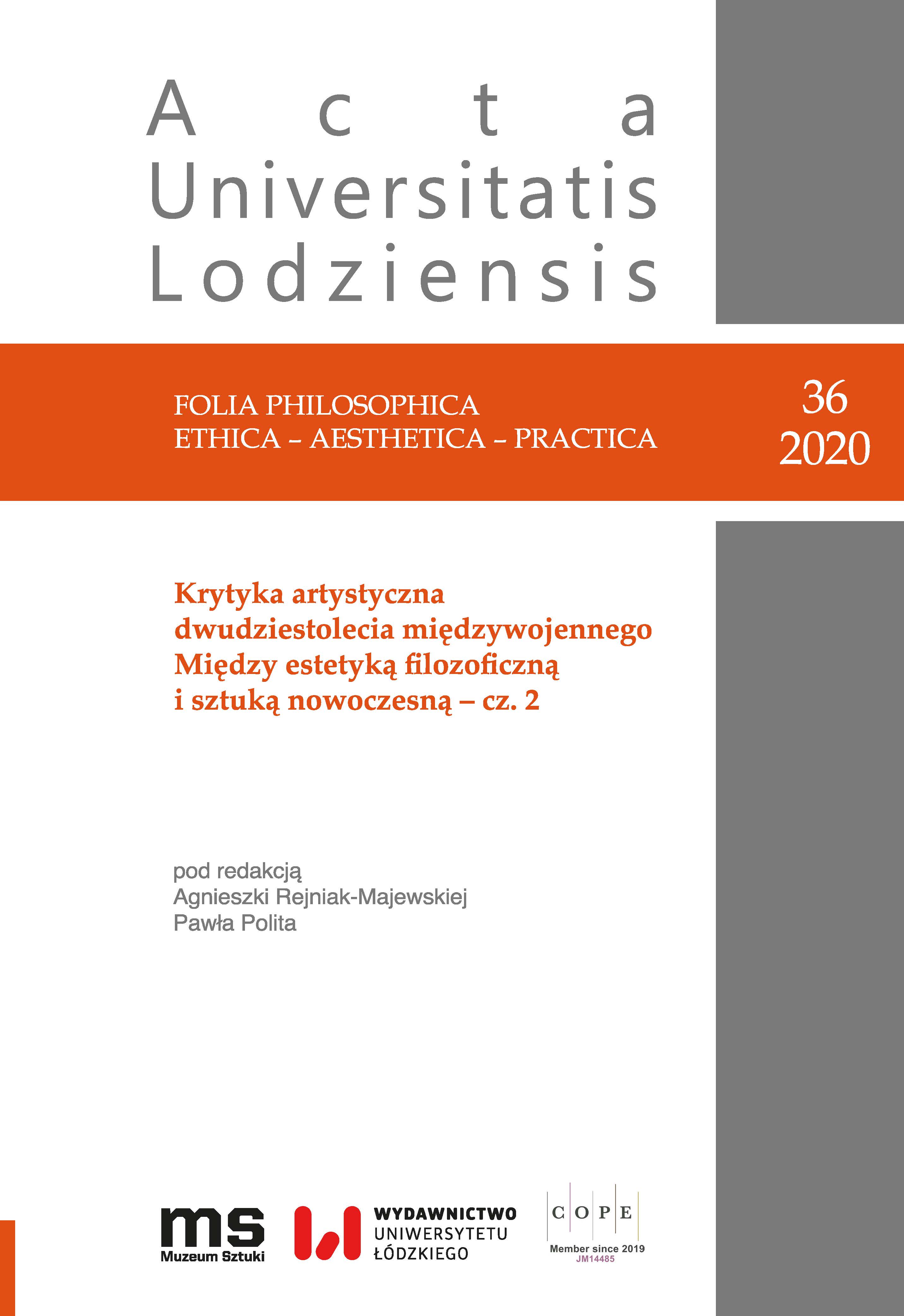The Fantastic as the Unconcealment of Truth in Debora Vogel’s Work
DOI:
https://doi.org/10.18778/0208-6107.36.03Keywords:
the fantastic, ingenuity, matter-of-factness, phantasm, simplicity, modernity, design, poetryAbstract
This essay examines the notion of the fantastic in Debora Vogel’s work. I argue that the fantastic for Vogel is simultaneously a novel artistic form and a form of life, as well as a singular use of language; it is both a “trait” of modernity and thinking of modernity. The fantastic is analyzed as a key term in the author’s understanding of modern design of space and objects through discussions of “Dwelling in its Psychic and Social Function” (1932), the critic’s essay on lived space. I demonstrate that Vogel’s reflections and theorizing of the fantastic are not necessarily aimed at the development of pure theory and concepts but rather at the performance of the fantastic in the author’s own theory-praxis through the lens of Vogel’s essay on poetics, “White Words in Poetry” (1930). The essay discusses various types of the fantastic which finds itself between matter-of-factness and phantasm: the fantastic of ingenuity, the fantastic of asymmetry, the fantastic of color, and the fantastic of simplicity. All of these different types set forth the unconcealment of truth.
References
Blooming Spaces: The Collected Poetry, Prose, Critical Writing, and Letters of Debora Vogel. Edited by Anastasiya Lyubas. Boston: Academic Studies Press, 2020.
Google Scholar
Derrida, Jacques. The Truth in Painting. Translated by Geoff Bennington and Ian McLeod. The Chicago: Chicago University Press, 1987.
Google Scholar
DOI: https://doi.org/10.7208/chicago/9780226807690.001.0001
Heidegger, Martin. The Origin of the Work of Art in Off the Beaten Track. Edited and translated by Julian Young and Kenneth Haynes. Cambridge: Cambridge University Press, 2002.
Google Scholar
Malabou, Catherine, “Pierre Loves Horranges. Levinas – Sartre – Nancy: an approach to the fantastic in philosophy.” Umbr(a), no. 1, 2006: 103–117.
Google Scholar
Malabou, Catherine, The Heidegger Change. On the Fantastic in Philosophy. Translated and edited by Peter Skafish. Albany: The SUNY Press, 2011.
Google Scholar
Montaże. Debora Vogel i nowa legenda miasta. Edited by Andrij Bojarov, Paweł Polit, Karolina Szymaniak. Łódź: Muzeum Sztuki w Łodzi, 2017.
Google Scholar
Vogel, Debora. Akacje kwitną. Montaże. Warszawa: Tow. Wydawnicze Rój, 1936.
Google Scholar
Vogel, Debora. “Henryk Streng – malarz konstryktywizmu.” Nasza Opinia, no. 96, 1937: 6.
Google Scholar
Vogel, Debora. “Leopold Pilichowski.” Opinia, no. 29, 1933: 6.
Google Scholar
Vogel, Debora. “Maks Feyering.” Tsushtayer, no. 2, 1930: 57–58
Google Scholar
Vogel, Debora. “Mieszkanie w swej funkcji psychicznej i społecznej.” Przegląd Społeczny, no. 8–9, 1932: 208–217.
Google Scholar
Vogel, Debora. “Romans dialektyki.” Przegląd Społeczny, vol. 9, no. 10, 1935: 243–247.
Google Scholar
Vogel, Debora. “Teme un forem in der kunst fun shagal [Theme and form in Chagall’s Art],”
Google Scholar
Tsushtayer, no. 1, 1929: 21–26 (part I); Tsushtayer, no. 2, 1930: 19–24.
Google Scholar
Vogel, Debora. Tog-figurn [Day Figures]. Lemberg-Varshe: Tsushtayer, 1930.
Google Scholar
Vogel, Debora. “Vayse verter in der dikhtung [White Words in Poetry].” Tsushtayer, no. 3, 1931: 42–48.
Google Scholar
Downloads
Published
How to Cite
Issue
Section
License

This work is licensed under a Creative Commons Attribution-NonCommercial-NoDerivatives 4.0 International License.












